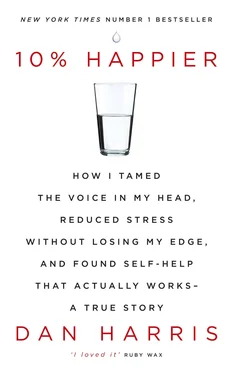One of the things I was often doing with that BlackBerry was sending emails to Ted Haggard. I’d hit him up every month or so, desperately seeking that exclusive interview whenever he emerged from seclusion. Journalism aside, I also was massively curious about where he was and what he was doing.
Nearly a year went by before he wrote me back. When at last I got him on the phone, he had an incredible story to tell: Time ’s 11th most influential American evangelical was now living with his family in a dingy apartment in Arizona, barely scraping by, selling insurance. Remarkably, his wife, Gayle, had decided to stand by him.
Several months later, on a frigid January morning in New York City, Ted and I sat down for his first network news interview since the scandal.
I was nervous—and it showed. I have a very obvious tell when I’m anxious: my face looks tired. And on this day I looked exhausted. I tried jumping up and down, slapping my cheeks, and standing out in the cold, but I couldn’t fix it. I was simply uncomfortable doing what was sure to be a tough interview with someone I knew and liked.
For the shoot, Wonbo had rented a studio downtown, and I was sitting in a cushioned chair opposite Ted, who was on a couch. Unlike me, he seemed entirely at ease with the inquisition that was to ensue. He was leaning back, legs crossed, wearing a blazer but no tie.
I dove right in. “Is it fair to describe you as a hypocrite and a liar?” I asked.
“Yes. Yes, it is,” he said, almost enthusiastically, as if he couldn’t wait to get this off his chest.
“Do you think you owe gay people an apology?” I asked.
“Absolutely. And I do apologize,” he said. “I’m deeply sorry for the attitude I had. But I think I was partially so vehement because—because of my own war.”
Amazingly to me, he insisted he wasn’t gay. Months of psychotherapy, he said, had cleared everything up. “Now I’m settled in the fact that I am a heterosexual, but with issues,” he said. “So I don’t fit into a neat little box.”
He said it was no problem to stay faithful to his wife. “It’s not a struggle at all now.”
“Why not just live as a gay man?” I asked.
“’Cause I love my wife. I love my intimate relationship with my wife. I’m not gay.”
“Can you hear people watching this, though, and thinking to themselves, ‘This guy is just not being honest with himself?’ ”
“Sure, but everybody has their own journey. And people can judge me. I think it’s fair if they judge me and that they think I’m not being real with myself.”
The toughest moment in the interview came when I surprised him by playing him a damning piece of videotape we’d obtained. It was an interview with a former parishioner, a young man who said he’d been sexually harassed by Ted. On the tape he described, in graphic terms, how one night Ted had hopped into bed with him in a hotel room and began to masturbate.
When the video ended, Ted said, “It is true. We never had any sexual contact, but I violated that relationship and it was an inappropriate relationship.”
“What’s it like to watch that?” I asked.
“It’s embarrassing. That was very embarrassing. I mean, I am . . . I am a failure.”
When it was all over, Ted didn’t seem at all resentful that I’d blind-sided him. I had coffee with him and his wife and we chatted as if none of it had ever happened. We talked a lot about what Ted’s next move might be. The one thing he swore he’d never do again was pastor a church. (A couple of months later, he asked me to meet him and Gayle for lunch at a midtown hotel because they wanted advice on how to pitch a reality show they were dreaming up. When that didn’t take off, they started a church.)
What struck me most from the interview was not Ted’s slipperiness or his eyebrow-raising claims about the nature of sexuality or even his wife’s decision not to file for divorce; it was something else. For all of Ted’s hypocrisy and deception, there was one issue on which he did not waver: his faith. “I never fell away from God,” he told me. When I pointed out that it was his religious beliefs that forced him to live a lie for so many years, he countered that it was the “culture of hatefulness” in the modern church that did that, not the core teachings of Jesus himself. In his darkest moments, when he was living in that apartment in Arizona, crying every day for a year and a half and actively contemplating suicide, his faith was his main source of comfort. It gave him the sense that his travails were part of a larger plan, that even if everyone on earth hated him, his creator did not. “I knew with assurance,” he said, “that God cared for me.”
In the weeks and months after the interview, I kept coming back to this. I, too, had endured my own self-created crisis, albeit of a less public and less intense variety. Ted’s involved doing drugs and cheating on his wife; mine involved doing drugs and having a nationally televised freak-out. On this score, I envied Ted—and not in a patronizing, I-wish-I-were-stupid-enough-to-believe-this-stuff way. It would have been enormously helpful to have had a sense that my troubles had a larger purpose or fit into some overarching plan. I had read the research showing that regular churchgoers tended to be happier, in part because having a sense that the world is infused with meaning and that suffering happens for a reason helped them deal more successfully with life’s inevitable humiliations.
Up until my interview with Ted, I had derived a smug sense of self-satisfaction that, unlike the believers I was covering, I did not have a deep need for answers to the Big Questions; I was comfortable with the mystery of how we got here and what would happen after we died. But I now realized that a sort of incuriosity had set in; my sense of awe had atrophied. I might have disagreed with the conclusions reached by people of faith, but at least that part of their brain was functioning. Every week, they had a set time to consider their place in the universe, to step out of the matrix and achieve some perspective. If you’re never looking up, I now realized, you’re always just looking around.
Ted Haggard, who had taught me to see people of faith in a different light, had also taught me something else: the value of a viewpoint that transcended the mundane. Of course, I wasn’t forsaking ambition—and I wasn’t planning to magically force myself to believe in something for which there was, in my opinion, insufficient evidence. However, I was about to cover a story that, for the first time since Peter Jennings ordered me to start reporting on spirituality, would actually penetrate my defenses. The message came in a deeply weird and extremely confusing package.
Chapter 3
Genius or Lunatic?
The man sitting across from me and completely blowing my mind favored a style, both verbal and sartorial, so monochrome that it was as if he wanted to vanish like a chameleon into the barf-colored wallpaper of this hotel room in Toronto. He was elfin, rheumy-eyed, and, as the cameras rolled, droning on in a gentle Teutonic lilt. Superficially, at least, he was the type of person who, if you met him at a cocktail party, you would either ignore or avoid.
And yet he was saying extraordinary things. Life-altering things. He was making points that were forcing me to rethink my whole “price of security” modus operandi. Not just rethink it, but think above it, beyond it—and possibly go beyond thought altogether.
The real mindfuck, though, was this: almost as soon as he said something brilliant, he would say something else that struck me as totally ridiculous. The man was apparently toggling seamlessly between compelling and confusing, incisive and insane.
Читать дальше












